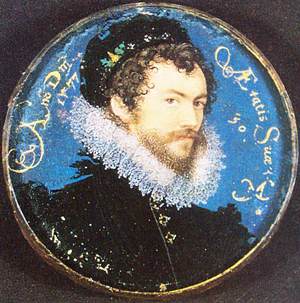Court politics
"A friend i' th' Court is better than a penny in purse." So says Justice Shallow, well aware that if Falstaff retains the favour of Prince Hal, he will be able to exert great--and profitable--influence. (Henry the Fourth, Part Two 5.1.28.)
Under Elizabeth, court officers were paid a pittance--part of her notorious parsimoniousness --but they were able to make substantial sums by peddling influence to those who sought the granting of suits*, exploiting their favoured position. The system* only worked because Elizabeth was careful not to be influenced by those whose sole aim was profit.
Court politics are important in many of Shakespeare's plays. Courtly scheming provides material for comedy* in The Winter's Tale and for wistful reflection* in King Lear.
About the illustration
Nicholas Hilliard was not particularly involved in Court politics, but his dashing self-portrait makes him look rather like a typical machiavel--one of those scheming Lords in the history plays. Click for more on the art of the miniaturist.
Footnotes
-
An unfortunate suit
A "suit" is a special request, a favour; the word was often punned on. An instructive example is Francis Bacon, who, while seeking a position at Court, assiduously followed Elizabeth's favourite, the Earl of Essex. Elizabeth, however, while favouring Essex, seldom listened to him, with the result that Bacon was out of luck until the accession of James I.
Bacon's enemies eventually destroyed him by accusing him of accepting bribes; Bacon's
(unsuccessful) defence was that everyone did it.
-
Shallow justice
For the system of bribes to bring in any effective revenue to those with influence, sometimes justice had to be seen to fail because of an effective bribe. Thus Davy argues in Henry IV, Part Two:
Davy: I beseech you sir, to countenance
[favour] William Vidor of Woncot against Clement Perkes o' th' hill.
Shallow: There is many complaints, Davy, against that Visor. That Visor is an arrant knave, on my knowledge.
Davy: I grant your worship that he is a knave, sir, but yet, God forbid, sir, but an arrant knave should have some countenance at his friend's request. . . I have served your worship truly, sir, this eight or ten years--and I cannot once or twice in a quarter bear out a knave against an honest man, I have but a very little credit with your worship.
Shallow: Go to, I say he shall have no wrong.
(5.1.39-54) -
The rogue as courtier
Autolycus, newly dressed in borrowed courtier's robes, terrorizes the old Shepherd and his son; he also promises to use his supposed influence at Court with the enraged King Polixenes:
Tell me, for you seem to be honest plain men, what you have to the king; being something gently considered [adequately bribed], I'll bring you where he is aboard, tender you persons to his presence, whisper him in your behalfs. . .
(The Winter's Tale, 4.4.798-802) -
God's spies
King Lear, captured by the armies of his elder daughters, speaks lovingly to his youngest, Cordelia, planning their retreat in prison, away from the intrigues and gossip of court life:
. . . so we'll live,
And pray, and sing, and tell old tales, and laugh
At gilded butterflies, and hear poor rogues
Talk of court news; and we'll talk with them too,
Who loses and who wins; who's in, who's out;
And take upon's the mystery of things,
As if we were God's spies; and we'll wear out,
In a wall'd prison, packs and sects of great ones,
That ebb and flow by the moon.
(King Lear 5.3.11-19)
